Unit 6 单元综合复习课件 (人教版英语八年级下册Unit 6 An old man tried to move the mountains.)
文档属性
| 名称 | Unit 6 单元综合复习课件 (人教版英语八年级下册Unit 6 An old man tried to move the mountains.) |  | |
| 格式 | pptx | ||
| 文件大小 | 37.9MB | ||
| 资源类型 | 试卷 | ||
| 版本资源 | 人教新目标(Go for it)版 | ||
| 科目 | 英语 | ||
| 更新时间 | 2024-06-03 07:06:36 | ||
图片预览



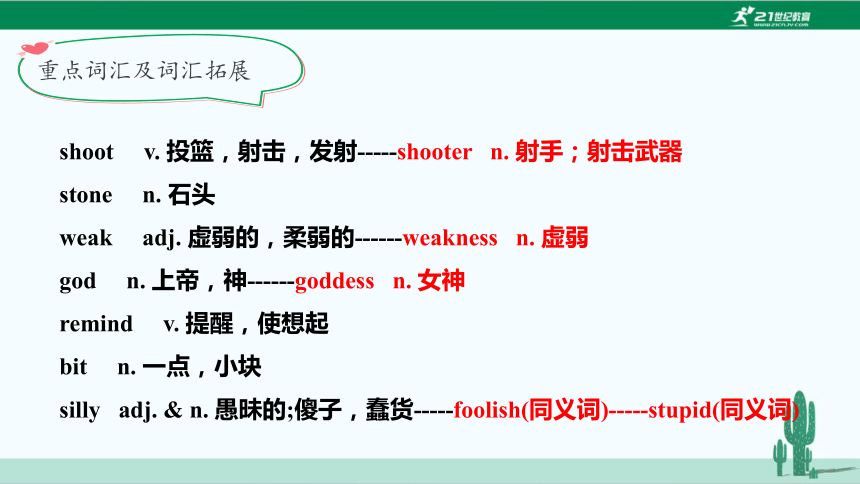



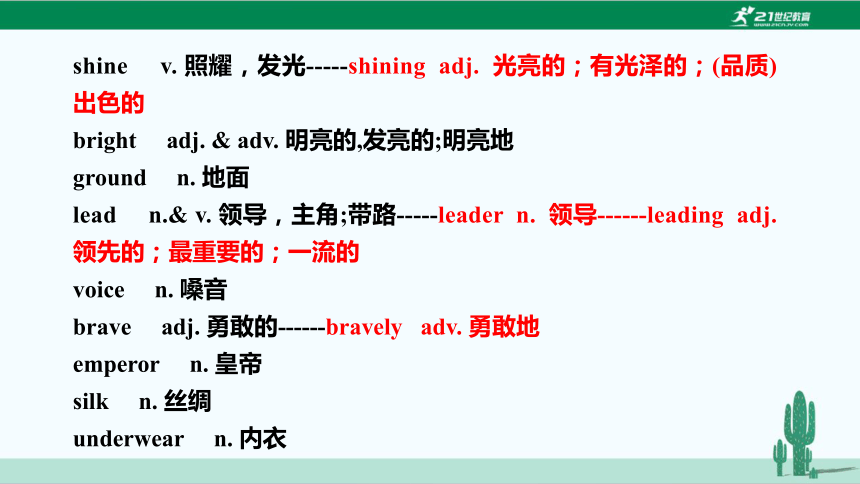
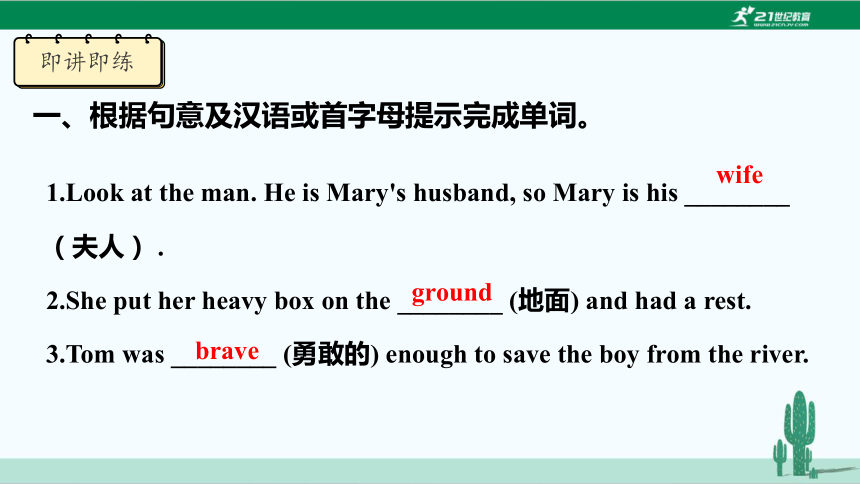
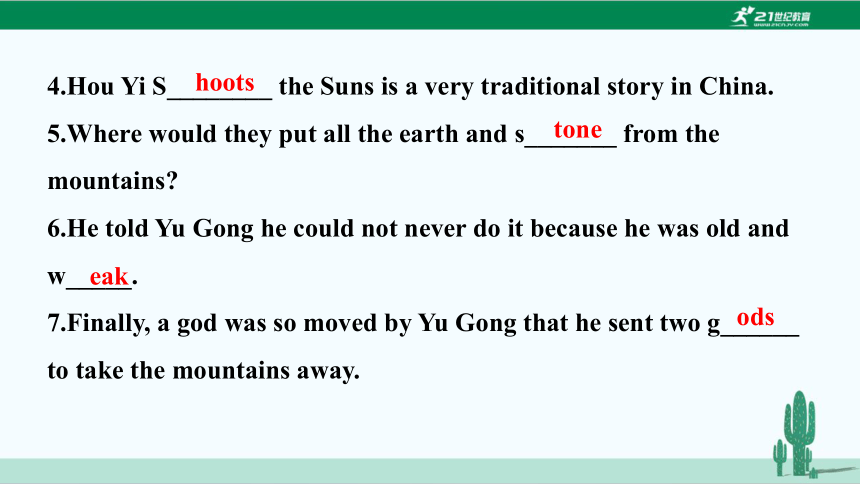

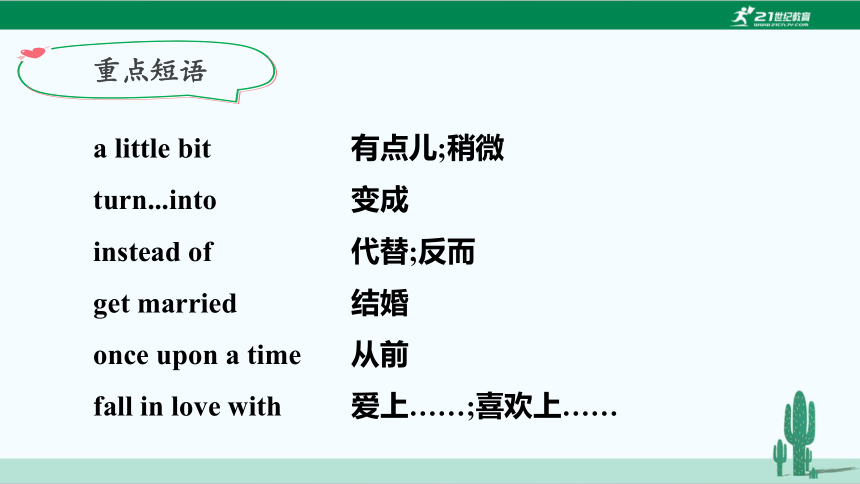
文档简介
(共72张PPT)
Unit 6 单元综合复习
人教版八年级下册
Content
词汇、短语回顾
01
重点句子回顾
02
重点词句精讲
03
语法知识精讲
04
单元话题写作
05
能力提升训练
06
目录
词汇、短语回顾
重点词汇及词汇拓展
shoot v. 投篮,射击,发射-----shooter n. 射手;射击武器
stone n. 石头
weak adj. 虚弱的,柔弱的------weakness n. 虚弱
god n. 上帝,神------goddess n. 女神
remind v. 提醒,使想起
bit n. 一点,小块
silly adj. & n. 愚昧的;傻子,蠢货-----foolish(同义词)-----stupid(同义词)
object n. 物体,目标,物品
hide v. 躲藏,隐藏
tail n. 尾巴
magic n. 魔法,巫术-----magician n. 魔术师
stick n. & v. 棍,棒;刺,戳,插
excite v. 使激动,使兴奋
Western adj. 西方的,欧美的-----west n. 西方;西部
stepsister n. 继姐(妹)
prince n. 王子------prince n. 公主
fit v. 适合,合身
couple n. (尤指)夫妻,两人
smile n.& v. 微笑
marry v. 与某人结婚-----married adj. 已婚的-----marriage n. 结婚;婚姻
gold n. 黄金,金币-------gold adj. 金的;金质的-----golden hair金发
nobody pron. 无人,没有任何人,谁也不
stupid adj. & n. 愚蠢的,傻的;傻子
cheat v. 欺骗,愚弄
stepmother n. 继母
wife n. 妻子-----wives(复数)
husband n. 丈夫
whole adj. 全部的,整体的
scene n. 舞台,(戏剧)场景
moonlight n. 月光
shine v. 照耀,发光-----shining adj. 光亮的;有光泽的;(品质)出色的
bright adj. & adv. 明亮的,发亮的;明亮地
ground n. 地面
lead n.& v. 领导,主角;带路-----leader n. 领导------leading adj.领先的;最重要的;一流的
voice n. 嗓音
brave adj. 勇敢的------bravely adv. 勇敢地
emperor n. 皇帝
silk n. 丝绸
underwear n. 内衣
1.Look at the man. He is Mary's husband, so Mary is his ________(夫人) .
2.She put her heavy box on the ________ (地面) and had a rest.
3.Tom was ________ (勇敢的) enough to save the boy from the river.
一、根据句意及汉语或首字母提示完成单词。
即讲即练
wife
ground
brave
4.Hou Yi S________ the Suns is a very traditional story in China.
5.Where would they put all the earth and s_______ from the mountains
6.He told Yu Gong he could not never do it because he was old and w_____.
7.Finally, a god was so moved by Yu Gong that he sent two g______ to take the mountains away.
tone
eak
ods
hoots
8.This story r________ us that you can never know what’s possible unless you try to make it happen.
9.He is not very clever and always does s_______ things.
10.I think it’s a little b_______ silly. It doesn’t seem very possible to move a mountain.
eminds
illy
it
a little bit 有点儿;稍微
turn...into 变成
instead of 代替;反而
get married 结婚
once upon a time 从前
fall in love with 爱上……;喜欢上……
重点短语
take away 拿走
try to do sth. 设法做某事
agree with 同意;赞同
be able to do sth. 能够做某事
for the first time 首次;第一次
main character 主要角色
fight bad people 与坏人作斗争
come out 出来;出版
become interested in... 对……变得感兴趣
one of the most popular stories 最受欢迎的故事之一
all over the world 全世界
be new to... 初见的;不熟悉的
the whole family 全家
wake up 醒来
make a plan 制订计划
in the moonlight 在月光下
go out 外出(娱乐)
get lost 迷路
look at the moon 赏月
never mind (用于安慰)没关系
lead sb.to... 带领某人去……
work on 从事(某工作);致力于
as soon as一 ……就……
in fact 确切地说;事实上;实际上
think of 认为;想起
made of 由……制成的
即讲即练
1. 从前, 有个漂亮的小女孩住在这个小城市。
________ _______ ________ _______, there was a beautiful girl living in this small city.
2. 天一黑, 他们就一起赶快回家了。
________ _______ ________it was dark, they went home quickly together.
3. 这些花非但不长反而萎缩了。
These flowers are shrinking________ _______growing.
一、根据汉语提示完成句子。
Once upon a time
instead of
As soon as
4. 他的早期经历最终使他变成了一位黑人总统。
His early experience_______himself______a Negro president at last.
5. 当他八岁的时候, Liu对踢足球感兴趣。
Liu_____________ _______ ________playing soccer when he was eight years old.
6. 你要是自己占有了这些食物, 其他人会不高兴的。
If you________these food______ _______, others will be unhappy.
keep for yourself
turned into
became/was interested in
7. 他大了, 能骑自行车了。
He is old_________ _______ ride a bike.
8. 昨天斯密斯引领这个老人去了医院。
Smith ________ the old man ________ the hospital yesterday.
9. 那个时候我们听见他正在谈论足球赛。
We ________ him ________ about the soccer game at that time.
10. 不要担心。我们可以把问题变为挑战。
Don’t worry. We can ________ problems ________ challenges.
enough to
led to
heard talking
turn into
重点句子回顾
1.So what do you think about the story of Yu Gong 你觉得愚公的故事怎么样?
2. It doesn't seem very possible to move a mountain. 把一座山给移掉好像不太可能。
3.This is because he can make 72 changes to his shape and size, turning himself into different animals and objects. 这是因为他会根据他的形状和大小,做出72种变化,可以将自己变成不同的动物或东西。
4.Sometimes he can make the stick so small that he can keep it in his ear. 有时候,他能够让他的金箍棒变得很小,以至于可以放在耳朵里。
5.Because they were so big that it took a long time to walk to the other side. 这些(山)太高了,他们要花好长时间才能翻越过去。
6.Don't eat it until you get to the forest. 你们到达森林之后才能吃。
重点词句精讲
1. finish doing
finish意为“完成,结束”,作及物动词时,其后可跟名词、代词或动名词。即:finish sth.或finish doing sth.。例如:
I finished my homework this morning.
我今天上午做完了作业。
When did you finish drawing the picture
你什么时候画完那副画的?
Can you finish reading this book tomorrow
明天你能读完这本书吗?
【拓展】
能接v.-ing作宾语的动词还有:practice; enjoy; mind; keep等。
practice doing sth. 练习做某事
enjoy doing sth.喜欢做某事
mind doing sth.介意做某事
keep doing sth. 一直做某事 例如:
In my class, most of the students enjoy singing English songs.
在我们班,大多数学生喜欢唱英语歌。
Do you mind opening the window 你介意打开窗户吗?
2. finally
finally是副词,可位于句中、句首或句尾,位于句中时,要放在be动词、助动词和情态动词之后,行为动词之前。例如:
They finally found the lost child. 他们终于找到了丢失的孩子。
He worked out the math problem finally. 他终于解出了那道数学题。
【拓展】finally; at last和in the end的辨析:
(1) finally强调在列举论点时,引出最后一个内容,有表示盼望已久的事情终于实现了的含义。侧重最后的结果。例如:
They talked about it for hours, finally they decided not to go.
他们为此讨论了几个小时,最后决定不去了。
(2) at last强调经过曲折后才达到目的。表示期待的感情更为强烈。侧重指先后顺序,并且在句中的位置较为灵活。例如:
When they found him at last, he was almost dead.
当他们最终找到他时,他几乎死过去了。
(3) in the end在强调经过许多变化、困难之后才达到目的时,与at last的用法一样,且位置较为灵活。但在表示对将来的结局表示预测时,只能用in the end。例如:
He tried many different jobs, and in the end he became a postman.
他做过许多工作,最后当了一名邮递员。
3. remind
(1) remind是及物动词,意思是“提醒、使某人想起”,经常和介词of连用,构成动词短语remind sb. of sb. / sth.=remind sb. that+从句,意思是“使某人想起某事或者某人”。
例如:Does that song remind you of your mother
那首歌使你想起你的妈妈吗?
(2) 动词短语remind sb. to do sth. 的意思是“提醒某人做某事”。
例如:Please remind me to return the books to the library.
请提醒我把这些书还给图书馆。
4. sound stupid
sound在此是系动词,意为“听起来”,后面接形容词作表语。
例如:The song sounds wonderful! 那首歌听起来太精彩了!
The music sounds beautiful. 这首音乐听起来很美。
【拓展】类似sound这种用法的词还有:feel(摸起来,感觉);smell(闻起来);look(看起来);taste(品尝)等。例如:
The food tastes delicious. 食物尝起来很美味。
I feel so happy today. Mum will buy me a new bike.
我今天很高兴,妈妈要为我买辆新自行车。
The old man looks very happy. 那个老人看起来很幸福。
These flowers smell very sweet. 这些花闻起来很香。
The tomatoes feel very soft. 这些西红柿摸起来很软。
【注意】smell; look等系动词不同于系动词be,它们在变疑问句或否定句时不能简单地提到主语之前或加not,而是要通过助动词do/does/ did等来帮助实现。例如:
Does it smell nice 它闻起来很好吗?
The chicken doesn’t taste good. 鸡肉尝起来不好。
How do the children look 孩子们看起来怎么样?
5. get married
(1) get married意为“结婚”。若问某人是否结婚,而不涉及结婚的对象,可用be / get married的形式,相当于系表结构。例如:
你结婚了吗?
【误】 Do you marry / Have you married
【正】 Are you married / Have you got married
(2) be / get married to sb. 意为“与某人结婚”。例如:
Alice was married to a doctor last month. 上个月爱丽丝和一位医生结婚了
【拓展】marry既可用作及物动词,也可用作不及物动词,意为“结婚;嫁;娶;与……结婚等”。常见用法如下:
(1) marry sb.意为“与……结婚”。例如:
John married Mary last week. 上星期约翰和玛丽结婚了。
(2) marry sb. to sb.意为“把某人嫁给某人”。例如:
She married her daughter to a businessman. 她把女儿嫁给了一位商人。
(3) marry 一般不与介词with 连用。
【误】She married with an Englishman.
【正】She married an Englishman.她和一位英国人结了婚。
6. along
along作介词,意为“沿着”,课本中的along the way意为“沿路”。
例如:There are trees all along the road. 沿着这条路从头到尾都有树。
【拓展】along;across与through的辨析:
(1) along意为“沿着”,指沿着一条直线在水平方向上运动。例如:
I saw him running along the road. 我看见他正沿着这条路跑。
(2) across意为“横过,穿过”,主要表示从某物的表面横过。例如:
He walked across the road carefully. 他小心地走过马路。
(3) through意为“横过,穿过”,表示从某个空间或内部穿过。例如:
He walked through the forest alone. 他独自一人走过森林。
7. maybe
maybe作副词,意为“也许;大概”
例如:Maybe he is a teacher. 也许他是个老师。
【拓展】辨析:maybe与may be
(1) maybe是副词,意为“也许,大概”。它通常放在句子的开头,在句子中作状语。例如:
Maybe they won’t come here tonight. 他们大概今晚不会来这儿。
(2) may be是“情态动词may+动词原形be”构成的,在句中做谓语,意为“可能是、大概是”。例如:
She may be at home. 她可能在家。(也可以说:Maybe she is at home.)
8. be made of
be made of 意为“由……制成”,强调从制成品中仍可以看出原材料。
The desk is made of woods. 桌子是由木头制成的。
【拓展】be made 后接不同的介词,具有不同的意义。
(1) be made from意为“用……制成”,强调从制成品中看不出原材料。
Books are made from woods. 书是由木头制成的。
(2) be made in 意为“由……制造(生产)”,强调生产地点,in后只接地点的名词。
The kind of watch is made in Shanghai. 这种手表是在上海制造的。
(3) be made up of 意为“由……组成”或“由……构成”, 强调由多种成分、团体、成员或单位等组成或构成。
Our class is made up of twenty-eight girls and sixteen boys.
我们班由二十八个女孩和十六个男孩组成。
(4) be made into意为“把……制成……”,注意表示原材料的词作句子的主语,表示制成品的词作介词into的宾语。
Glass can be made into all kinds of beautiful things.
玻璃可以制成各种各样漂亮的物品。
9. As soon as the man finish talking, Yu Gong said that his family…
as soon as意为“一……就……”,引导时间状语从句。例如:
Please call back as soon as you arrive home.
请你一到家,就给我回电。
I’ll write to you as soon as I get there.
我一到那儿就给你写信。
As soon as I went in, Katherine cried out with pleasure.
我一进门,Katherine 就高兴的叫起来。
【拓展】as soon as 引导的时间状语从句前后时态搭配:
(1) 主句为一般将来时,从句用一般现在时表示将来。例如:
He will come to my home as soon as he gets to Beijing.
他一到北京就来我家。
(2) 主句为一般过去时,从句也用一般过去时。例如:
He took out his English book as soon as he sat down.
他一坐下,就拿出他的英语书。
10. Finally, a god was so moved by Yu Gong that he sent two gods to take the mountains away.
so…that…引导结果状语从句,意为“如此……以至于……”,此句型中,so是副词,常用来修饰形容词或副词。常用句型为:主语+谓语+ so+ adj./adv. + that从句。例如:
Our teacher is so kind that all of us like him.
我们的老师是如此好心以至于我们都喜欢他。
He runs so fast that nobody in my class can catch up with him.
他跑得那么快,我们班没有人能追上他
【拓展】“如此……以至于……”归纳:
(1) so + 形容词 + a/an + 单数名词 + that从句 = such + a/an + 形容词 + 单数名词+ that从句。例如:
It was so fine a day yesterday that we all went out for a picnic. = It was such a fine day yesterday that we all went out for a picnic.
昨天天气很好,我们都出去野餐了。
(2) such + 形容词 + 复数名词/不可数名词 + that从句。例如:
They are such good students that the teacher likes them.
他们都是很好的学生,老师喜欢他们。
It was such fine weather yesterday that we went swimming.
昨天天气很好,我们去游泳了。
(3)当that前的名词有表示数量多少的many, much, few, little等修饰时,只能用so,不能用such。例如:
There was so much noise outside that we couldn’t hear the teacher.
外面嘈杂声很大,以致我们不能听到老师的话。
He had so many falls that he was black and blue all over.
他跌了这么多的跤,以致全身青一块、紫一块的。
11. It doesn’t seem very possible to move a mountain.
seem此处作连系动词,意为“似乎;好像”,后跟形容词作表语。可以和seem to be相互转换。例如:
He seems very angry. = He seems to be very angry.
他好像非常生气。
【拓展】
(1) “主语 + seem + (to be) +表语”,表语多为名词或形容词,以说明主语的特征或状态。例如:
Tom seems (to be) a very clever boy. Tom看上去是一个非常聪明的男孩。
Mr. Black seemed to be quite happy. Black先生好像十分快乐。
(2) “主语 + seem + 不定式”,此句型中,seem与不定式一起构成复合谓语。例如:
Mrs. Green doesn’t seem to like the idea. 格林夫人似乎不太喜欢这个主意
The children seemed to be eating something in the room. 孩子们好像正在房间里吃东西呢。
(3) “It seems + that从句”,其中it是形式主语,that引导主语从句。例如:
It seems that no one knows what has happened in the park.
似乎没有人知道在公园里发生了什么事。
It seems to me that Mr. Brown will not come again. 在我看来布朗先生不会再来了。
(4) “There + seem to be + 名词”,to be可省略,seem的单复数要由后面的名词决定。例如:
There doesn’t seem to be much hope of our beating that team.
看来我们战胜那个队没有多大希望。
There seems no need to wait longer. 看来没有再等的必要了。
12. ...what’s possible unless you try to make it happen.
unless是连词,引导条件状语从句,意为“除非……;如果不……;除了……”,常引导一个否定意义的真实条件句,有时也可引导非真实条件句。unless引导的条件状语从句中的谓语动词常用一般现在时代替一般将来时。主要用于下列情况:
(1) 主句为肯定句:
You will miss the bus unless you hurry up. 你要不快点就会错过班车。
You’ll fail in chemistry again unless you work harder. 如果你不再加把劲,你化学考试还会不及格。
(2) 主句为否定句:
One can’t learn a foreign language unless he studies hard.
不下苦功夫是学不好外语的。
I will not go unless I hear from him.
如果我不收到他的来信,我就不去。
【拓展】unless与if…not的辨析:
unless与if…not都表否定,连接条件状语从句时,通常可互换。
I’ll go there unless it rains. = I’ll go there if it doesn’t rain. 我会去那儿,除非下雨。(如果不下雨,我就去。)
只能用if…not的情况
表示“由于未发生B而发生A”时
I’d be glad if she doesn’t come this evening. 如果今天晚上她不来,我将很高兴。
引导虚拟条件句时
If she weren’t so silly, she would understand. 如果她不那么傻,她就会明白了。
13. Did you hear our stepmother planning to kill us
hear sb. doing sth.表示“听到某人正在做某事(正在进行)”。例如:
I heard him singing when I walked past the shop.
昨天我路过商店时,听见他正在唱歌。
【拓展】
(1) hear sb. do sth.表示“听到某人经常做某事或做某事的全过程(已完成)”。例如:
I usually hear someone sing in her room. 我经常听到有人在她房间里唱歌。
(2) hear of意为“听说”,后面接名词,代词或动名词。例如:
I have never heard of him.
我从来没有听说过他。
(3) hear from sb.意为“收到某人的来信”,与receive a letter from sb.意思相同。例如:
I heard from my mother yesterday.
= I received a letter from my mother yesterday.
昨天我收到了妈妈的来信。
语法知识精讲
if 意为“如果”,unless意为“除非”,都可以引导条件状语从句。
若 if 条件句放句首,从句后面要加逗号,和主句 隔开。
条件状语从句,如果主句的动词用一般将来时,从句仍然是一般现在时。
引导条件状语从句,unless 相当于if…not。
if 和 unless引导的条件状语从句
e.g. I won’t let you in unless you show me your pass.
= I won’t let you in if you don't show me your pass.
如果你不出示通行证,我就不让你进来。
I’ll be quite glad if she doesn’t come this evening.
她今晚如果不来我很高兴。
Unless you take more care, you’ll have an accident.如果不多加小心的话,你会出事故的。
My baby sister never cries unless she is hungry.
我那刚出生的妹妹除非饿了,否则她是从来不哭的。
as soon as为连词,意为“一......就......”引导时间状语从句。
当主句是一般将时态或祈使句,表示将的意义时,从句通常用一般现在时,简称“主将从现”。
I’ll ring you up as soon as I get to Beijing.我一到北京就给你打电话。
They will post me the tickets/post the tickets to me as soon as they receive my cheque. 他们收到我的支票后就立刻把票寄给我。
as soon as 引导的时间状语从句
so...that...意为“如此......以至于......”,that引导结果状语从句。
其句型为:主语+谓语+ so +形容词/副词+ that从句。
so后面用形容词,副词。
He was so angry that he couldn’t say a word.他气得一句话也说不出来。
She wored so hard that she passed the eam.她努力工作,结果通过了考试。
so…that…引导的结果状语从句
【注意】:当so...that...引导的结果状语从句是肯定句时,可以与be...enough to do进行转换;当从句是否定句时,so ...that...可与too...to...或be not ...enough to do进行转换。
The boy is so clever that he answer the question easily.
= The boy is clever enough to answer the question easily.
这个男孩很聪明,他很容易回答这个问题。
The girl is so young that she can’t loo after herself.
= The girl is too young to loo after herself.
= The girl isn’t old enough to loo after herself.
这个女孩太小了,不能自己上厕所。
单元话题写作
单元话题写作
单元写作目标
此单元以“传说和故事”为中心话题,具体到写作中,要求学生能用自己的语言讲述一个经典故事。写作时,注意按照故事发展的开端、过程、结局构思,并以精练的语言介绍故事的寓意或传达的精神,表述自己的看法。讲述故事时所用的时态以一般过去时为主,在表达自己的观点看法时以一般现在时为主。
素材积累
开头句
1. I’d like to tell you a story called…
2. Once upon a time, there was a princess.
中间句
1. It happened on a rainy night/…
2. How does the story begin
3. What happened next
4. I think it’ s a little bit/really interesting…
结尾句
1. In the end, they all lived a happy life.
2. The story is trying to show/tell us that never judge people by their looks.
3. The story reminds us that you can never know what’s possible unless you try to make it happen.
4. I learned from the story that we should keep trying and never give up.
范例
在世界历史文化长河中流传着许多家喻户晓的故事,有奇妙的中国传说,有美好的西方童话,从《愚公移山》到《白雪公主》,从《美猴王》到《灰姑娘》,从《后羿射日》到《皇帝的新装》……人们每每诵读或讲述都会倍感鼓舞,深受启迪。请你选择一个你最喜欢的故事,以“My Favorite Story”为题写一篇80词左右的短文,跟大家分享一下吧!
提示:1. 简单介绍一个你最喜欢的故事(包括开头、过程和结果);
2. 你为什么喜欢这个故事 你从这个故事中得到什么启发
审题
1. 文体:记叙文
2. 时态:一般过去时和一般现在时
3. 人称:以第一人称为主
My Favorite Story
I love reading and one of my favorite stories is Yu Gong Moves the Mountains. Once upon a time, Yu Gong tried to move two mountains with his family. Although many people couldn’t understand him and didn’t think he could do it, he didn’t give up and finally did it.
I really love the story because I love the character Yu Gong. Besides, the story is meaningful. I can learn a lot from it. When I face some difficulties, I shouldn’t give up easily. I’ll try to work them out.
能力提升训练
一、用括号内所给单词的适当形式填空。
1.I will finish ________ (read) the novel tomorrow.
2.You should keep ________ (try). I believe that you will do it well.
3.It's ___________ (possible) for me to finish the work in two days. I will try to finish it in five days.
4.She can speak English ________ (well) than me. Can you tell me how to practice my spoken English
reading
impossible
better
trying
5.The god was ________ (move) by what the old man did and decided to help him.
6.If you keep __________ (write), you will be able to become a writer one day.
7.He ________ (shoot)a big bird and went home happily with it.
8.Neither of them ________ (think)that the film is interesting.
9.Reading more is a good way to ________ (learn)English well.
shot
moved
writing
thinks
learn
二、根据句意,选择最佳选项。
1.— Why do you like the play
— Because it reminds me _______ my best friend.
A. with B. for C. to D. of
2.— Don’t give up. Everything will be fine soon.
— Yes. We should learn to be _______ when we are in trouble.
A. brave B. quiet C. sad D. angry
C
A
3.— I’m a little _______ these days and I don`t know why.
— I think you should eat more healthy food and do more exercise.
A. silly B. weak C. carefulD. smart
4. Let`s have a cup of tea _______ you like a cold drink.
A. since B. ifC. unless D. because
B
C
5. The knife is dangerous. You must _______ it from the children.
A. buy B. hide C. bring D. carry
6.— Does that skirt _______ her
— Sure. She is really beautiful in it.
A. hit B. keep C. fix D. fit
B
D
三、书面表达
为鼓励大家阅读,提高同学们阅读兴趣,老师决定在本周五英语课上进行读书分享会,和同学们分享你喜欢的一本书或一个故事。请根据下面的提示写一篇短文,在英语课上和大家分享。
内容提示:
1. What’s your favorite story/book
2. What do you think of it
3. Why do you like it
要求:1. 80词左右;可适当发挥;
2. 不得出现真实的人名和校名。
My Favorite Story
I love reading and I have read many books. My favorite story is The Three Little Pigs. There were three little pigs in the story. They built their own houses. The first built a straw house. The second built a wooden house. The third built a brick house. Then a wolf hit the straw house and the wooden house. But he couldn’t hit the brick house because it was very strong. At last, the three pigs killed the wolf.
This is my favorite story, because it is interesting and it teaches us to be hard-working. There are also many colorful pictures in the book.
【参考范文】
谢谢
21世纪教育网(www.21cnjy.com)
中小学教育资源网站
兼职招聘:
https://www.21cnjy.com/recruitment/home/admin
Unit 6 单元综合复习
人教版八年级下册
Content
词汇、短语回顾
01
重点句子回顾
02
重点词句精讲
03
语法知识精讲
04
单元话题写作
05
能力提升训练
06
目录
词汇、短语回顾
重点词汇及词汇拓展
shoot v. 投篮,射击,发射-----shooter n. 射手;射击武器
stone n. 石头
weak adj. 虚弱的,柔弱的------weakness n. 虚弱
god n. 上帝,神------goddess n. 女神
remind v. 提醒,使想起
bit n. 一点,小块
silly adj. & n. 愚昧的;傻子,蠢货-----foolish(同义词)-----stupid(同义词)
object n. 物体,目标,物品
hide v. 躲藏,隐藏
tail n. 尾巴
magic n. 魔法,巫术-----magician n. 魔术师
stick n. & v. 棍,棒;刺,戳,插
excite v. 使激动,使兴奋
Western adj. 西方的,欧美的-----west n. 西方;西部
stepsister n. 继姐(妹)
prince n. 王子------prince n. 公主
fit v. 适合,合身
couple n. (尤指)夫妻,两人
smile n.& v. 微笑
marry v. 与某人结婚-----married adj. 已婚的-----marriage n. 结婚;婚姻
gold n. 黄金,金币-------gold adj. 金的;金质的-----golden hair金发
nobody pron. 无人,没有任何人,谁也不
stupid adj. & n. 愚蠢的,傻的;傻子
cheat v. 欺骗,愚弄
stepmother n. 继母
wife n. 妻子-----wives(复数)
husband n. 丈夫
whole adj. 全部的,整体的
scene n. 舞台,(戏剧)场景
moonlight n. 月光
shine v. 照耀,发光-----shining adj. 光亮的;有光泽的;(品质)出色的
bright adj. & adv. 明亮的,发亮的;明亮地
ground n. 地面
lead n.& v. 领导,主角;带路-----leader n. 领导------leading adj.领先的;最重要的;一流的
voice n. 嗓音
brave adj. 勇敢的------bravely adv. 勇敢地
emperor n. 皇帝
silk n. 丝绸
underwear n. 内衣
1.Look at the man. He is Mary's husband, so Mary is his ________(夫人) .
2.She put her heavy box on the ________ (地面) and had a rest.
3.Tom was ________ (勇敢的) enough to save the boy from the river.
一、根据句意及汉语或首字母提示完成单词。
即讲即练
wife
ground
brave
4.Hou Yi S________ the Suns is a very traditional story in China.
5.Where would they put all the earth and s_______ from the mountains
6.He told Yu Gong he could not never do it because he was old and w_____.
7.Finally, a god was so moved by Yu Gong that he sent two g______ to take the mountains away.
tone
eak
ods
hoots
8.This story r________ us that you can never know what’s possible unless you try to make it happen.
9.He is not very clever and always does s_______ things.
10.I think it’s a little b_______ silly. It doesn’t seem very possible to move a mountain.
eminds
illy
it
a little bit 有点儿;稍微
turn...into 变成
instead of 代替;反而
get married 结婚
once upon a time 从前
fall in love with 爱上……;喜欢上……
重点短语
take away 拿走
try to do sth. 设法做某事
agree with 同意;赞同
be able to do sth. 能够做某事
for the first time 首次;第一次
main character 主要角色
fight bad people 与坏人作斗争
come out 出来;出版
become interested in... 对……变得感兴趣
one of the most popular stories 最受欢迎的故事之一
all over the world 全世界
be new to... 初见的;不熟悉的
the whole family 全家
wake up 醒来
make a plan 制订计划
in the moonlight 在月光下
go out 外出(娱乐)
get lost 迷路
look at the moon 赏月
never mind (用于安慰)没关系
lead sb.to... 带领某人去……
work on 从事(某工作);致力于
as soon as一 ……就……
in fact 确切地说;事实上;实际上
think of 认为;想起
made of 由……制成的
即讲即练
1. 从前, 有个漂亮的小女孩住在这个小城市。
________ _______ ________ _______, there was a beautiful girl living in this small city.
2. 天一黑, 他们就一起赶快回家了。
________ _______ ________it was dark, they went home quickly together.
3. 这些花非但不长反而萎缩了。
These flowers are shrinking________ _______growing.
一、根据汉语提示完成句子。
Once upon a time
instead of
As soon as
4. 他的早期经历最终使他变成了一位黑人总统。
His early experience_______himself______a Negro president at last.
5. 当他八岁的时候, Liu对踢足球感兴趣。
Liu_____________ _______ ________playing soccer when he was eight years old.
6. 你要是自己占有了这些食物, 其他人会不高兴的。
If you________these food______ _______, others will be unhappy.
keep for yourself
turned into
became/was interested in
7. 他大了, 能骑自行车了。
He is old_________ _______ ride a bike.
8. 昨天斯密斯引领这个老人去了医院。
Smith ________ the old man ________ the hospital yesterday.
9. 那个时候我们听见他正在谈论足球赛。
We ________ him ________ about the soccer game at that time.
10. 不要担心。我们可以把问题变为挑战。
Don’t worry. We can ________ problems ________ challenges.
enough to
led to
heard talking
turn into
重点句子回顾
1.So what do you think about the story of Yu Gong 你觉得愚公的故事怎么样?
2. It doesn't seem very possible to move a mountain. 把一座山给移掉好像不太可能。
3.This is because he can make 72 changes to his shape and size, turning himself into different animals and objects. 这是因为他会根据他的形状和大小,做出72种变化,可以将自己变成不同的动物或东西。
4.Sometimes he can make the stick so small that he can keep it in his ear. 有时候,他能够让他的金箍棒变得很小,以至于可以放在耳朵里。
5.Because they were so big that it took a long time to walk to the other side. 这些(山)太高了,他们要花好长时间才能翻越过去。
6.Don't eat it until you get to the forest. 你们到达森林之后才能吃。
重点词句精讲
1. finish doing
finish意为“完成,结束”,作及物动词时,其后可跟名词、代词或动名词。即:finish sth.或finish doing sth.。例如:
I finished my homework this morning.
我今天上午做完了作业。
When did you finish drawing the picture
你什么时候画完那副画的?
Can you finish reading this book tomorrow
明天你能读完这本书吗?
【拓展】
能接v.-ing作宾语的动词还有:practice; enjoy; mind; keep等。
practice doing sth. 练习做某事
enjoy doing sth.喜欢做某事
mind doing sth.介意做某事
keep doing sth. 一直做某事 例如:
In my class, most of the students enjoy singing English songs.
在我们班,大多数学生喜欢唱英语歌。
Do you mind opening the window 你介意打开窗户吗?
2. finally
finally是副词,可位于句中、句首或句尾,位于句中时,要放在be动词、助动词和情态动词之后,行为动词之前。例如:
They finally found the lost child. 他们终于找到了丢失的孩子。
He worked out the math problem finally. 他终于解出了那道数学题。
【拓展】finally; at last和in the end的辨析:
(1) finally强调在列举论点时,引出最后一个内容,有表示盼望已久的事情终于实现了的含义。侧重最后的结果。例如:
They talked about it for hours, finally they decided not to go.
他们为此讨论了几个小时,最后决定不去了。
(2) at last强调经过曲折后才达到目的。表示期待的感情更为强烈。侧重指先后顺序,并且在句中的位置较为灵活。例如:
When they found him at last, he was almost dead.
当他们最终找到他时,他几乎死过去了。
(3) in the end在强调经过许多变化、困难之后才达到目的时,与at last的用法一样,且位置较为灵活。但在表示对将来的结局表示预测时,只能用in the end。例如:
He tried many different jobs, and in the end he became a postman.
他做过许多工作,最后当了一名邮递员。
3. remind
(1) remind是及物动词,意思是“提醒、使某人想起”,经常和介词of连用,构成动词短语remind sb. of sb. / sth.=remind sb. that+从句,意思是“使某人想起某事或者某人”。
例如:Does that song remind you of your mother
那首歌使你想起你的妈妈吗?
(2) 动词短语remind sb. to do sth. 的意思是“提醒某人做某事”。
例如:Please remind me to return the books to the library.
请提醒我把这些书还给图书馆。
4. sound stupid
sound在此是系动词,意为“听起来”,后面接形容词作表语。
例如:The song sounds wonderful! 那首歌听起来太精彩了!
The music sounds beautiful. 这首音乐听起来很美。
【拓展】类似sound这种用法的词还有:feel(摸起来,感觉);smell(闻起来);look(看起来);taste(品尝)等。例如:
The food tastes delicious. 食物尝起来很美味。
I feel so happy today. Mum will buy me a new bike.
我今天很高兴,妈妈要为我买辆新自行车。
The old man looks very happy. 那个老人看起来很幸福。
These flowers smell very sweet. 这些花闻起来很香。
The tomatoes feel very soft. 这些西红柿摸起来很软。
【注意】smell; look等系动词不同于系动词be,它们在变疑问句或否定句时不能简单地提到主语之前或加not,而是要通过助动词do/does/ did等来帮助实现。例如:
Does it smell nice 它闻起来很好吗?
The chicken doesn’t taste good. 鸡肉尝起来不好。
How do the children look 孩子们看起来怎么样?
5. get married
(1) get married意为“结婚”。若问某人是否结婚,而不涉及结婚的对象,可用be / get married的形式,相当于系表结构。例如:
你结婚了吗?
【误】 Do you marry / Have you married
【正】 Are you married / Have you got married
(2) be / get married to sb. 意为“与某人结婚”。例如:
Alice was married to a doctor last month. 上个月爱丽丝和一位医生结婚了
【拓展】marry既可用作及物动词,也可用作不及物动词,意为“结婚;嫁;娶;与……结婚等”。常见用法如下:
(1) marry sb.意为“与……结婚”。例如:
John married Mary last week. 上星期约翰和玛丽结婚了。
(2) marry sb. to sb.意为“把某人嫁给某人”。例如:
She married her daughter to a businessman. 她把女儿嫁给了一位商人。
(3) marry 一般不与介词with 连用。
【误】She married with an Englishman.
【正】She married an Englishman.她和一位英国人结了婚。
6. along
along作介词,意为“沿着”,课本中的along the way意为“沿路”。
例如:There are trees all along the road. 沿着这条路从头到尾都有树。
【拓展】along;across与through的辨析:
(1) along意为“沿着”,指沿着一条直线在水平方向上运动。例如:
I saw him running along the road. 我看见他正沿着这条路跑。
(2) across意为“横过,穿过”,主要表示从某物的表面横过。例如:
He walked across the road carefully. 他小心地走过马路。
(3) through意为“横过,穿过”,表示从某个空间或内部穿过。例如:
He walked through the forest alone. 他独自一人走过森林。
7. maybe
maybe作副词,意为“也许;大概”
例如:Maybe he is a teacher. 也许他是个老师。
【拓展】辨析:maybe与may be
(1) maybe是副词,意为“也许,大概”。它通常放在句子的开头,在句子中作状语。例如:
Maybe they won’t come here tonight. 他们大概今晚不会来这儿。
(2) may be是“情态动词may+动词原形be”构成的,在句中做谓语,意为“可能是、大概是”。例如:
She may be at home. 她可能在家。(也可以说:Maybe she is at home.)
8. be made of
be made of 意为“由……制成”,强调从制成品中仍可以看出原材料。
The desk is made of woods. 桌子是由木头制成的。
【拓展】be made 后接不同的介词,具有不同的意义。
(1) be made from意为“用……制成”,强调从制成品中看不出原材料。
Books are made from woods. 书是由木头制成的。
(2) be made in 意为“由……制造(生产)”,强调生产地点,in后只接地点的名词。
The kind of watch is made in Shanghai. 这种手表是在上海制造的。
(3) be made up of 意为“由……组成”或“由……构成”, 强调由多种成分、团体、成员或单位等组成或构成。
Our class is made up of twenty-eight girls and sixteen boys.
我们班由二十八个女孩和十六个男孩组成。
(4) be made into意为“把……制成……”,注意表示原材料的词作句子的主语,表示制成品的词作介词into的宾语。
Glass can be made into all kinds of beautiful things.
玻璃可以制成各种各样漂亮的物品。
9. As soon as the man finish talking, Yu Gong said that his family…
as soon as意为“一……就……”,引导时间状语从句。例如:
Please call back as soon as you arrive home.
请你一到家,就给我回电。
I’ll write to you as soon as I get there.
我一到那儿就给你写信。
As soon as I went in, Katherine cried out with pleasure.
我一进门,Katherine 就高兴的叫起来。
【拓展】as soon as 引导的时间状语从句前后时态搭配:
(1) 主句为一般将来时,从句用一般现在时表示将来。例如:
He will come to my home as soon as he gets to Beijing.
他一到北京就来我家。
(2) 主句为一般过去时,从句也用一般过去时。例如:
He took out his English book as soon as he sat down.
他一坐下,就拿出他的英语书。
10. Finally, a god was so moved by Yu Gong that he sent two gods to take the mountains away.
so…that…引导结果状语从句,意为“如此……以至于……”,此句型中,so是副词,常用来修饰形容词或副词。常用句型为:主语+谓语+ so+ adj./adv. + that从句。例如:
Our teacher is so kind that all of us like him.
我们的老师是如此好心以至于我们都喜欢他。
He runs so fast that nobody in my class can catch up with him.
他跑得那么快,我们班没有人能追上他
【拓展】“如此……以至于……”归纳:
(1) so + 形容词 + a/an + 单数名词 + that从句 = such + a/an + 形容词 + 单数名词+ that从句。例如:
It was so fine a day yesterday that we all went out for a picnic. = It was such a fine day yesterday that we all went out for a picnic.
昨天天气很好,我们都出去野餐了。
(2) such + 形容词 + 复数名词/不可数名词 + that从句。例如:
They are such good students that the teacher likes them.
他们都是很好的学生,老师喜欢他们。
It was such fine weather yesterday that we went swimming.
昨天天气很好,我们去游泳了。
(3)当that前的名词有表示数量多少的many, much, few, little等修饰时,只能用so,不能用such。例如:
There was so much noise outside that we couldn’t hear the teacher.
外面嘈杂声很大,以致我们不能听到老师的话。
He had so many falls that he was black and blue all over.
他跌了这么多的跤,以致全身青一块、紫一块的。
11. It doesn’t seem very possible to move a mountain.
seem此处作连系动词,意为“似乎;好像”,后跟形容词作表语。可以和seem to be相互转换。例如:
He seems very angry. = He seems to be very angry.
他好像非常生气。
【拓展】
(1) “主语 + seem + (to be) +表语”,表语多为名词或形容词,以说明主语的特征或状态。例如:
Tom seems (to be) a very clever boy. Tom看上去是一个非常聪明的男孩。
Mr. Black seemed to be quite happy. Black先生好像十分快乐。
(2) “主语 + seem + 不定式”,此句型中,seem与不定式一起构成复合谓语。例如:
Mrs. Green doesn’t seem to like the idea. 格林夫人似乎不太喜欢这个主意
The children seemed to be eating something in the room. 孩子们好像正在房间里吃东西呢。
(3) “It seems + that从句”,其中it是形式主语,that引导主语从句。例如:
It seems that no one knows what has happened in the park.
似乎没有人知道在公园里发生了什么事。
It seems to me that Mr. Brown will not come again. 在我看来布朗先生不会再来了。
(4) “There + seem to be + 名词”,to be可省略,seem的单复数要由后面的名词决定。例如:
There doesn’t seem to be much hope of our beating that team.
看来我们战胜那个队没有多大希望。
There seems no need to wait longer. 看来没有再等的必要了。
12. ...what’s possible unless you try to make it happen.
unless是连词,引导条件状语从句,意为“除非……;如果不……;除了……”,常引导一个否定意义的真实条件句,有时也可引导非真实条件句。unless引导的条件状语从句中的谓语动词常用一般现在时代替一般将来时。主要用于下列情况:
(1) 主句为肯定句:
You will miss the bus unless you hurry up. 你要不快点就会错过班车。
You’ll fail in chemistry again unless you work harder. 如果你不再加把劲,你化学考试还会不及格。
(2) 主句为否定句:
One can’t learn a foreign language unless he studies hard.
不下苦功夫是学不好外语的。
I will not go unless I hear from him.
如果我不收到他的来信,我就不去。
【拓展】unless与if…not的辨析:
unless与if…not都表否定,连接条件状语从句时,通常可互换。
I’ll go there unless it rains. = I’ll go there if it doesn’t rain. 我会去那儿,除非下雨。(如果不下雨,我就去。)
只能用if…not的情况
表示“由于未发生B而发生A”时
I’d be glad if she doesn’t come this evening. 如果今天晚上她不来,我将很高兴。
引导虚拟条件句时
If she weren’t so silly, she would understand. 如果她不那么傻,她就会明白了。
13. Did you hear our stepmother planning to kill us
hear sb. doing sth.表示“听到某人正在做某事(正在进行)”。例如:
I heard him singing when I walked past the shop.
昨天我路过商店时,听见他正在唱歌。
【拓展】
(1) hear sb. do sth.表示“听到某人经常做某事或做某事的全过程(已完成)”。例如:
I usually hear someone sing in her room. 我经常听到有人在她房间里唱歌。
(2) hear of意为“听说”,后面接名词,代词或动名词。例如:
I have never heard of him.
我从来没有听说过他。
(3) hear from sb.意为“收到某人的来信”,与receive a letter from sb.意思相同。例如:
I heard from my mother yesterday.
= I received a letter from my mother yesterday.
昨天我收到了妈妈的来信。
语法知识精讲
if 意为“如果”,unless意为“除非”,都可以引导条件状语从句。
若 if 条件句放句首,从句后面要加逗号,和主句 隔开。
条件状语从句,如果主句的动词用一般将来时,从句仍然是一般现在时。
引导条件状语从句,unless 相当于if…not。
if 和 unless引导的条件状语从句
e.g. I won’t let you in unless you show me your pass.
= I won’t let you in if you don't show me your pass.
如果你不出示通行证,我就不让你进来。
I’ll be quite glad if she doesn’t come this evening.
她今晚如果不来我很高兴。
Unless you take more care, you’ll have an accident.如果不多加小心的话,你会出事故的。
My baby sister never cries unless she is hungry.
我那刚出生的妹妹除非饿了,否则她是从来不哭的。
as soon as为连词,意为“一......就......”引导时间状语从句。
当主句是一般将时态或祈使句,表示将的意义时,从句通常用一般现在时,简称“主将从现”。
I’ll ring you up as soon as I get to Beijing.我一到北京就给你打电话。
They will post me the tickets/post the tickets to me as soon as they receive my cheque. 他们收到我的支票后就立刻把票寄给我。
as soon as 引导的时间状语从句
so...that...意为“如此......以至于......”,that引导结果状语从句。
其句型为:主语+谓语+ so +形容词/副词+ that从句。
so后面用形容词,副词。
He was so angry that he couldn’t say a word.他气得一句话也说不出来。
She wored so hard that she passed the eam.她努力工作,结果通过了考试。
so…that…引导的结果状语从句
【注意】:当so...that...引导的结果状语从句是肯定句时,可以与be...enough to do进行转换;当从句是否定句时,so ...that...可与too...to...或be not ...enough to do进行转换。
The boy is so clever that he answer the question easily.
= The boy is clever enough to answer the question easily.
这个男孩很聪明,他很容易回答这个问题。
The girl is so young that she can’t loo after herself.
= The girl is too young to loo after herself.
= The girl isn’t old enough to loo after herself.
这个女孩太小了,不能自己上厕所。
单元话题写作
单元话题写作
单元写作目标
此单元以“传说和故事”为中心话题,具体到写作中,要求学生能用自己的语言讲述一个经典故事。写作时,注意按照故事发展的开端、过程、结局构思,并以精练的语言介绍故事的寓意或传达的精神,表述自己的看法。讲述故事时所用的时态以一般过去时为主,在表达自己的观点看法时以一般现在时为主。
素材积累
开头句
1. I’d like to tell you a story called…
2. Once upon a time, there was a princess.
中间句
1. It happened on a rainy night/…
2. How does the story begin
3. What happened next
4. I think it’ s a little bit/really interesting…
结尾句
1. In the end, they all lived a happy life.
2. The story is trying to show/tell us that never judge people by their looks.
3. The story reminds us that you can never know what’s possible unless you try to make it happen.
4. I learned from the story that we should keep trying and never give up.
范例
在世界历史文化长河中流传着许多家喻户晓的故事,有奇妙的中国传说,有美好的西方童话,从《愚公移山》到《白雪公主》,从《美猴王》到《灰姑娘》,从《后羿射日》到《皇帝的新装》……人们每每诵读或讲述都会倍感鼓舞,深受启迪。请你选择一个你最喜欢的故事,以“My Favorite Story”为题写一篇80词左右的短文,跟大家分享一下吧!
提示:1. 简单介绍一个你最喜欢的故事(包括开头、过程和结果);
2. 你为什么喜欢这个故事 你从这个故事中得到什么启发
审题
1. 文体:记叙文
2. 时态:一般过去时和一般现在时
3. 人称:以第一人称为主
My Favorite Story
I love reading and one of my favorite stories is Yu Gong Moves the Mountains. Once upon a time, Yu Gong tried to move two mountains with his family. Although many people couldn’t understand him and didn’t think he could do it, he didn’t give up and finally did it.
I really love the story because I love the character Yu Gong. Besides, the story is meaningful. I can learn a lot from it. When I face some difficulties, I shouldn’t give up easily. I’ll try to work them out.
能力提升训练
一、用括号内所给单词的适当形式填空。
1.I will finish ________ (read) the novel tomorrow.
2.You should keep ________ (try). I believe that you will do it well.
3.It's ___________ (possible) for me to finish the work in two days. I will try to finish it in five days.
4.She can speak English ________ (well) than me. Can you tell me how to practice my spoken English
reading
impossible
better
trying
5.The god was ________ (move) by what the old man did and decided to help him.
6.If you keep __________ (write), you will be able to become a writer one day.
7.He ________ (shoot)a big bird and went home happily with it.
8.Neither of them ________ (think)that the film is interesting.
9.Reading more is a good way to ________ (learn)English well.
shot
moved
writing
thinks
learn
二、根据句意,选择最佳选项。
1.— Why do you like the play
— Because it reminds me _______ my best friend.
A. with B. for C. to D. of
2.— Don’t give up. Everything will be fine soon.
— Yes. We should learn to be _______ when we are in trouble.
A. brave B. quiet C. sad D. angry
C
A
3.— I’m a little _______ these days and I don`t know why.
— I think you should eat more healthy food and do more exercise.
A. silly B. weak C. carefulD. smart
4. Let`s have a cup of tea _______ you like a cold drink.
A. since B. ifC. unless D. because
B
C
5. The knife is dangerous. You must _______ it from the children.
A. buy B. hide C. bring D. carry
6.— Does that skirt _______ her
— Sure. She is really beautiful in it.
A. hit B. keep C. fix D. fit
B
D
三、书面表达
为鼓励大家阅读,提高同学们阅读兴趣,老师决定在本周五英语课上进行读书分享会,和同学们分享你喜欢的一本书或一个故事。请根据下面的提示写一篇短文,在英语课上和大家分享。
内容提示:
1. What’s your favorite story/book
2. What do you think of it
3. Why do you like it
要求:1. 80词左右;可适当发挥;
2. 不得出现真实的人名和校名。
My Favorite Story
I love reading and I have read many books. My favorite story is The Three Little Pigs. There were three little pigs in the story. They built their own houses. The first built a straw house. The second built a wooden house. The third built a brick house. Then a wolf hit the straw house and the wooden house. But he couldn’t hit the brick house because it was very strong. At last, the three pigs killed the wolf.
This is my favorite story, because it is interesting and it teaches us to be hard-working. There are also many colorful pictures in the book.
【参考范文】
谢谢
21世纪教育网(www.21cnjy.com)
中小学教育资源网站
兼职招聘:
https://www.21cnjy.com/recruitment/home/admin
同课章节目录
- Unit 1 What's the matter?
- Section A
- Section B
- Unit 2 I'll help to clean up the city parks.
- Section A
- Section B
- Unit 3 Could you please clean your room?
- Section A
- Section B
- Unit 4 Why don't you talk to your parents?
- Section A
- Section B
- Unit 5 What were you doing when the rainstorm came
- Section A
- Section B
- Review of Units 1-5
- Unit 6 An old man tried to move the mountains.
- Section A
- Section B
- Unit 7 What's the highest mountain in the world?
- Section A
- Section B
- Unit 8 Have you read Treasure Island yet?
- Section A
- Section B
- Unit 9 Have you ever been to a museum?
- Section A
- Section B
- Unit 10 I've had this bike for three years.
- Section A
- Section B
